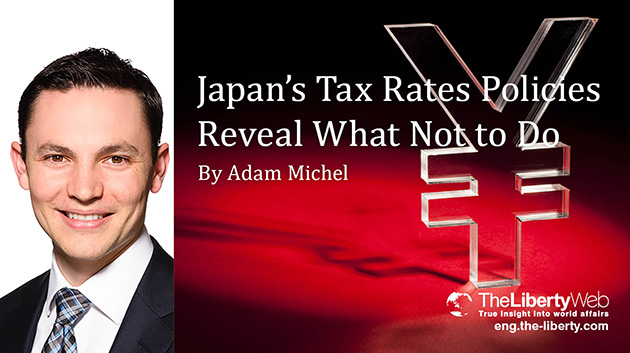Japan’s Tax Rates Policies Reveal What Not to Do
World economy is stagnating from the expansion of COVID-19. We ask a U.S. think tank’s economics expert about Japan’s consumption tax increase and U.S.’s economic policies.
Adam Michel The Heritage Foundation, Senior Policy Analyst
Michel received his PhD in Economics from George Mason University. He specializes in tax policies and federal budgets.
(Interviewer: Hanako Cho)
――The Trump administration announced a massive stimulus check in response to the coronavirus. What are your thoughts on that?
Dr. Michel: Sending people checks won’t change their behavior to fix the pandemic economic crisis. It doesn’t change anything fundamental about the cause of the economic downturn. A trillion-dollar spending package just puts us further in the hole for future generations, requiring higher taxes in the future.
Even in a crisis good policy doesn’t change. We should be focusing on removing barriers to business innovation and fixing problems in the already too-high tax code.
Japan Sets an Example of What Not to Do
――What is your take on Japan’s consumption tax hike conducted in last October?
Dr. Michel:I think the history of the Japanese value-added tax is very instructive for Americans in what we don’t want to do.
As soon as the consumption tax was increased, government spending skyrocketed. When taxes increase government grows by more than the amount of increased taxes.
I think Japan, again, just made another tremendous mistake with the consumption tax hike in October. I think the change into a bifurcated system made it even easier for the consumption tax rates to increase in the future. This is because when you have one rate on everything, raising the rate hits everyone across the board, and it’s politically more difficult. But the new administrative structure allows them to have multiple rates on different types of goods, and makes raising the rates on politically less sensitive goods easier.
――The Trump Administration is hinting a middle-class tax cut. What is your opinion on that?
Dr. Michel: The big tax cuts from 2017 expires at the end of 2025. And so that’s the cliff that forces action of some sort. However, we have to also start addressing the spending side, because we can’t continue to have multi-trillion-dollar tax cuts without any reduction in spending. Otherwise, our debt is going to look like Japan’s in a couple of years, which is bad for growth and prosperity.
Joe Biden is trying to increase tax $4 trillion over the next 10 years. If you actually want to fund his policy proposals, you have to start raising taxes on middle-class Americans, not just the wealthy.
Biden seems like a radical when compared to Democrats, even from just a couple of years ago. You look at what Obama ran on; You look at what Bill Clinton ran on and how he said, “The era of big government is over.” Those were very different proposals than what’s being floated today.
Properly Understanding Changes in Young People’s Minds
――May I ask why young generations are so attracted to socialism in the U.S.?
Dr. Michel: You can ask people in my generation, “Do you like socialism?” and they’ll say yes. But then you ask them to define socialism: you often don’t get a very coherent definition. They’ll say something like, “It means sharing,” or “It means we all get along better.”
And when you define it for them first, that socialism means “You don’t own anything; the government owns everything. Everything is distributed to you based on government-mandated criteria that have nothing to do with how hard you work or any of your ideas or personal decisions,” and then you ask them the same question, you get a very different answer.
We’ve allowed the left to misdiagnose the problem. If you look at all the things that young people are concerned about–high tuition costs, lots of education debt, skyrocketing health care costs¬–these are areas where the government is incredibly involved in the economy. These are government failures. The government pumps tons of money into these things, which is what has led to the dramatic price increases and the distortion in these markets.
There’s only one of two options: either you get to keep more of your money and live your life following your own choices, or the government takes more than 50% of what you earn every year through various taxes, and they will spend that however they see fit. And I think that’s a pretty stark choice, and I hope that America doesn’t go down the road with more government intervention.
――Behind the coronavirus there is the popular idea from the masses that the government will solve all their problems.
Dr. Michel:The government is really good at promising things they can’t deliver. In times of crisis people tend to want strong central control, which leads to waste and poorly timed responses. Local decision makers are usually better positioned to solve problems.
I hope the current crisis allows people to see the strength of our federal system, with state governors taking the lead.



















